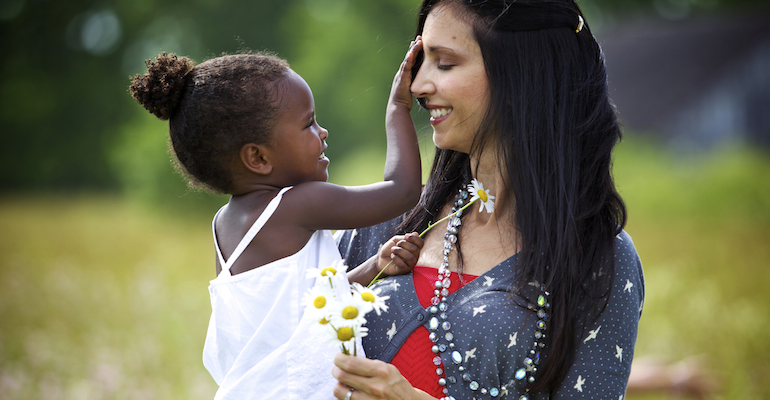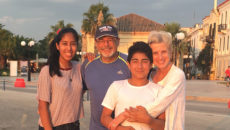The Clement family was enjoying their vacation. Four-year-old Sam played with another child at the pool, while his parents kept watch. The boy asked Sam, “Where’s your mommy?” Sam pointed to his parents, who waved cheerfully from their chairs. “How come you’re dark and your mommy is white?” the child asked. Confidently, Sam responded, “My mom and dad were born to people from New York, who had white skin. I was born to people from Colombia, who had brown skin. Then they adopted me. Wanna jump with me?” With much squealing and laughter, the jumping commenced.
Laying the Groundwork
Providing your child with the basics of his history prepares him to answer questions. Your child probably has been hearing his adoption story since he came home to join your family. The stories we tell our children about how they came to be ours are thrilling and affirming, so tell your child’s story often.
Using the word “adoption” in conversation, in a neutral tone, prepares our children to take charge of telling their personal story. When you talk about adoption with your child — or with others when he is in earshot — use words you want him to hear and use.
Give your child simple language to explain the obvious areas where questions might arise, such as differences in appearance. Practice exploring these differences: “What color is your skin? What color is Mommy’s? How come we have different skin?”
What to Say
Young children are not emotionally prepared to hear all the details of their adoption stories. They can’t understand all of the social or emotional reasons they became available for adoption, or why they were separated from their birth families. They know nothing of economics, politics, or social norms.
Preschoolers can understand that all babies and children need care. Talk with your child about what babies need from adults. They need to be fed, to be kept warm, to be taken to the doctor, to be held and soothed, to be bathed and dressed, and to have their diapers changed.
Children can be told that not all adults are able to provide this care. Some parents are too young, too sick, or don’t have what the baby needs to be healthy. Sometimes a family has to be found for a baby or child, so that the baby can get what he needs. If this arrangement is permanent, and the new family will be his for the rest of his life, we call it adoption.
Speak in universal terms: Say “all babies” rather than “you.” This helps young children to understand how adoption works in general, rather than thinking there must have been some deficiency in them, specifically, that led to their adoption.
When you calmly and openly talk about adoption, you arm your child with the ability to discuss his or her adoption matter-of-factly, as Sam was able to do with his new friend.



